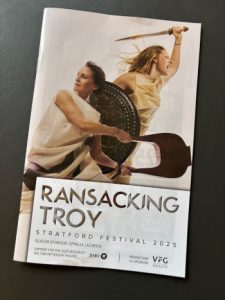
Ransacking Troy At The Stratford Festival
In Ransacking Troy, a lengthy retelling of the tales told by Homer in The Iliad and The Odyssey, feminist playwright Erin Shields imagines the women of the ancient epic, frustrated by the ten-year war, taking matters into their own hands.
Ransacking Troy begins with an enthusiastic Penelope (Maev Beaty) enlisting Clytemnestra (Irene Poole), queen of Mycenae to join her in following the men to Troy to set things to rights. Clytemnestra, who still mourns the death of her daughter Iphigenia, is reluctant but Penelope prevails. And the game is afoot.
Their goal is to end the war, bring peace, and birth a new world order of gender equality. Spoiler alert: They fail miserably. This presumably is one of Shield’s major points: plus ça change, plus c’est la même chose.
Ransacking Troy has two acts. The first is devoted to The Iliad, the second to The Odyssey. To summarize Shields’ version would be to summarize those two epics, so I will assume you are familiar with at least the rough outline of both. If not, there’s always Wikipedia.
Shields uses these stories to make a fair number of perfectly valid points. Men are self-centered, violent, arrogant brutes. Not to put too fine a point on it, men are shits. Women, while far superior to men in most respects, are abused, raped, demeaned, enslaved, taken for granted, ignored, and … well, you get the idea.
Shields makes such a persuasive case for the perfidy of men that I couldn’t help wondering why the women in her play were willing to go to such strenuous, not to mention dangerous lengths to bring their men home.
All of this would be bracing were it not for the fact that we’ve heard it all before, at great length, from many sources, including in Shields’ far superior Paradise Lost, in which Festival veteran Lucy Peacock was a spell-binding Satan. Indeed, Shields seems to have enjoyed a successful career making the same points over and over, usually in the context of subverting the work of some dead white male.
The script of Ransacking Troy alternates between some fine heightened language and perfectly puerile antics. There are a number of nicely written speeches for the major characters, delivered forcefully by some of the Festival’s finest actors. Then there is the scene in which the women, knowing they might have to disguise themselves as men, practice scratching their non-existent balls. This I should note was greeted with uproarious laughter. So much for the sophistication of the Festival audience.
Moments such as a scene in which Penelope and Clytemnestra hoodwink the credulous men by pretending to be goddesses required a willful suspension of disbelief far greater than I was able to muster.
Ransacking Troy is a world premiere and a Stratford Festival commission so I assume we are seeing it in its final form. I can’t help thinking that some more dramaturgical work, including some judicious cutting, would make for a more successful play.
If I found the script of Ransacking Troy less than persuasive, I have nothing but praise for the production under the kinetic and inspired direction of Jackie Maxwell. She is ably abetted by set and costume designer Judith Bowden, lighting designer Michael Walton, composer Deanna H. Choi, and sound designer Thomas Ryder Payne, all of whom make impressive contributions.
Maxwell has orchestrated a number of brilliant set pieces including a truly frightening storm at sea that earned a well-deserved round of applause.
When the women approach the gates of Hades they are enfolded in tentacles of black cloth that emerge from the floor. Thus possessed by the spirits of dead women they wail out the violent ways in which each was dispatched by a man. It’s a haunting image well rendered by the entire company.
What would a story about the Trojan War be without an appearance by the face that launched a thousand ships? In another inspired moment, Maxwell has Helen descend to the stage down a central aisle. Sheathed in a gold gown and looking as if she had just stepped out of a full-length portrait by John Singer Sargent, the ethereally beautiful Sara Topham gives us an entrance for the ages and one of the best scenes in the play.
Maxwell’s cast of nine women, all playing a variety of roles, male and female, are exemplary. Beaty and Poole, as Penelope and Clytemnestra, are solid anchors for the play’s action. Even when Shields requires them to have conversations with their husbands, playing both parts, they manage to pull it off without embarrassing themselves.
Also notable is Yanna Macintosh who makes a powerful Hecuba in a deus ex machina moment when she tells the women how the men have subverted their clever plan for peace.
While the entire company acquits themselves admirably in Shields’ epic, ultimately this is Maxwell’s evening. She would make a worthy successor to Antoni Cimolino as Artistic Director of the Festival, not that anyone in the corridors of power pays any attention to what I think. The new AD will announced later in the Fall. Buy Canadian!
Ransacking Troy continues at the Stratford Festival’s Tom Patterson Theatre through September 28, 2025. For more information and to purchase tickets visit the Stratford Festival website.
For a complete index of reviews CLICK HERE.
Don’t miss another review or blog post! SUBSCRIBE HERE

